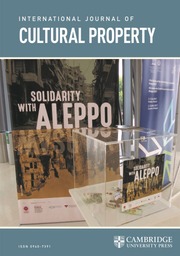Crossref Citations
This article has been cited by the following publications. This list is generated based on data provided by
Crossref.
Alexopoulos, Georgios
and
Fouseki, Kalliopi
2013.
Introduction: Managing Archaeological Sites in Greece.
Conservation and Management of Archaeological Sites,
Vol. 15,
Issue. 1,
p.
1.
Moustaira, Elina
2015.
Art Collections, Private and Public: A Comparative Legal Study.
p.
109.
Simandiraki-Grimshaw, Anna
2017.
An Archaeology of/for the Disenfranchised.
Journal of Eastern Mediterranean Archaeology and Heritage Studies,
Vol. 5,
Issue. 3-4,
p.
271.
Hartzoulaki, Katerina
2019.
Use and Protection of Archaeological Sites in Greece: Policies and Practices 1975–2018.
Heritage,
Vol. 2,
Issue. 1,
p.
366.
Konstantinidou, Danai
2021.
“Ruined Cities in Cyprus”.
Journal of Eastern Mediterranean Archaeology and Heritage Studies,
Vol. 9,
Issue. 4,
p.
313.
2022.
Arte. legge, restauro L’Europa e le prime prassi per la protezione del patrimonio.
Vol. 7,
Issue. ,
ÖZYILDIRIM, Mehmet Mert
2022.
TAŞINIR KÜLTÜR VARLIKLARININ HUKUKA UYGUN BİR BİÇİMDE DEVREDİLEBİLMELERİ AÇISINDAN TÜRK HUKUKUNDA KABUL EDİLEN YÖNTEMLER.
Ankara Hacı Bayram Veli Üniversitesi Hukuk Fakültesi Dergisi,
Vol. 26,
Issue. 3,
p.
393.
Markellou, Marina
2023.
Cultural Heritage Accessibility in the Digital Era and the Greek Legal Framework.
International Journal for the Semiotics of Law - Revue internationale de Sémiotique juridique,
Vol. 36,
Issue. 5,
p.
1945.
Katapidi, Ioanna
2023.
The role of conservation policies in local understandings of heritage in living heritage places: a Greek testimony.
International Journal of Heritage Studies,
Vol. 29,
Issue. 4,
p.
275.
Titi, Catharine
2023.
The Parthenon Marbles and International Law.
p.
125.
Witmore, Christopher
2023.
Argos: Across the Thin Surface of Time.
Archiv für Religionsgeschichte,
Vol. 25,
Issue. 1,
p.
251.
Titi, Catharine
2023.
The Parthenon Marbles and International Law.
p.
139.
Tsouparopoulou, Christina
2024.
The Early Dynastic “Maison des Fruits” at Tell K in Tello (Ĝirsu).
Bulletin of the American Society of Overseas Research,
p.
000.
Cytryn, Katia
2024.
Encyclopedia of Archaeology (Second Edition).
p.
370.




